16 may 2019
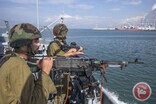
Israeli authorities have decided to drastically reduce the permitted fishing zone off Gaza’s coast "until further notice," on Thursday.
Head of the Palestinian Fishermen Union in Gaza, Zakariya Bakr, told Ma'an that Israeli authorities reduced the permitted fishing zone from 12 nautical miles to only five.
Bakr said that the Israeli naval forces prevented Palestinian fishermen from retrieving their fishing nets seven nautical miles off Gaza’s coast.
Bakr also pointed out that the Israeli navy opened heavy fire at fishermen who attempted to pass the five nautical miles, forcing them to sail back to shore in fear for their lives.
Israeli practices undermined the fishermen’s ability to make a living at sea.
It is noteworthy that only six days ago, Israeli authorities allowed the expansion of the permitted fishing zone to 12 nautical miles.
Palestinian fishermen, who try to make a living off the shores of the blockaded coastal enclave face daily risks, including routine harassment from Israeli naval forces, confiscation of boats and materials, detention and live fire.
According to the United Nations Office for Humanitarian Affairs (OCHA), in 1994, a permitted fishing range of 20 nautical miles was agreed on between Israel and the Palestinian Liberation Organization (PLO). In practice, Israel only allowed fishing up to 12 nautical miles until 2006, when the fishing zone was reduced to six and later to three.
Head of the Palestinian Fishermen Union in Gaza, Zakariya Bakr, told Ma'an that Israeli authorities reduced the permitted fishing zone from 12 nautical miles to only five.
Bakr said that the Israeli naval forces prevented Palestinian fishermen from retrieving their fishing nets seven nautical miles off Gaza’s coast.
Bakr also pointed out that the Israeli navy opened heavy fire at fishermen who attempted to pass the five nautical miles, forcing them to sail back to shore in fear for their lives.
Israeli practices undermined the fishermen’s ability to make a living at sea.
It is noteworthy that only six days ago, Israeli authorities allowed the expansion of the permitted fishing zone to 12 nautical miles.
Palestinian fishermen, who try to make a living off the shores of the blockaded coastal enclave face daily risks, including routine harassment from Israeli naval forces, confiscation of boats and materials, detention and live fire.
According to the United Nations Office for Humanitarian Affairs (OCHA), in 1994, a permitted fishing range of 20 nautical miles was agreed on between Israel and the Palestinian Liberation Organization (PLO). In practice, Israel only allowed fishing up to 12 nautical miles until 2006, when the fishing zone was reduced to six and later to three.
15 may 2019
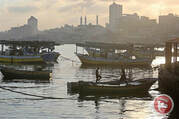
A Palestinian fisherman was shot and injured by Israeli naval forces while working off Gaza’s coast, on Wednesday.
The Palestinian Fishermen Union in Gaza told Ma'an that Mourad al-Hasi, 22, was shot and injured with a rubber-coated steel bullet fired by Israeli naval forces.
The union confirmed that the Israeli navy repeatedly opened heavy fire towards Palestinian fishermen within the permitted fishing zone of 12 nautical miles.
The fisherman's medical condition remained unknown.
It is noteworthy that last week Israeli authorities decided to expand the permitted fishing zone off Gaza’s coast to 12 nautical miles after the Israeli escalation during which the zone was drastically reduced.
As part of Israel's blockade of the coastal enclave since 2007, the Israeli army, citing security concerns, requires Palestinian fishermen to work within a limited "designated fishing zone," the exact limits of which are decided by the Israeli authorities and have historically fluctuated.
The Israeli army regularly detains and opens fire on unarmed Palestinian fishermen, shepherds, and farmers along the border areas if they approach the unilaterally declared buffer zone.
Israeli human rights group B'Tselem recently concluded that Israel's Gaza closure and "harassment of fishermen" have been "destroying Gaza's fishing sector," with 95% of fishermen living below the poverty line.
The Palestinian Fishermen Union in Gaza told Ma'an that Mourad al-Hasi, 22, was shot and injured with a rubber-coated steel bullet fired by Israeli naval forces.
The union confirmed that the Israeli navy repeatedly opened heavy fire towards Palestinian fishermen within the permitted fishing zone of 12 nautical miles.
The fisherman's medical condition remained unknown.
It is noteworthy that last week Israeli authorities decided to expand the permitted fishing zone off Gaza’s coast to 12 nautical miles after the Israeli escalation during which the zone was drastically reduced.
As part of Israel's blockade of the coastal enclave since 2007, the Israeli army, citing security concerns, requires Palestinian fishermen to work within a limited "designated fishing zone," the exact limits of which are decided by the Israeli authorities and have historically fluctuated.
The Israeli army regularly detains and opens fire on unarmed Palestinian fishermen, shepherds, and farmers along the border areas if they approach the unilaterally declared buffer zone.
Israeli human rights group B'Tselem recently concluded that Israel's Gaza closure and "harassment of fishermen" have been "destroying Gaza's fishing sector," with 95% of fishermen living below the poverty line.
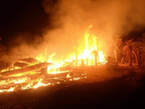
Large areas of Palestinian grazing lands were burnt, Tuesday, after the Israeli army conducted military drills in the West Bank’s Northern Plains.
The WAFA Palestinian News Agency said the soldiers carried out military training, including the use of explosives, in the al-Boqei’a ash-Sharqiya and Hamsa areas in the Northern Plains of the occupied West Bank.
Human Rights activist Aref Daraghma, told WAFA that the military training led to burning vast areas of grazing lands used by the Palestinian shepherds in the Jordan Valley.
He added that the locals, along with several firefighting trucks, started extinguishing the fire to prevent it from spreading to more lands.
On Sunday, the soldiers detained seven Palestinian journalists and one human rights worker, in the Northern Plains as they were documenting the army while displacing families to conduct military training.
The Israeli military drills are frequently carried out in the occupied West Bank, and the near Bedouin communities in the Negev, resulting in displacing the families in addition to the dozens of casualties, including fatalities, due to explosives dropped by the army during training.
The WAFA Palestinian News Agency said the soldiers carried out military training, including the use of explosives, in the al-Boqei’a ash-Sharqiya and Hamsa areas in the Northern Plains of the occupied West Bank.
Human Rights activist Aref Daraghma, told WAFA that the military training led to burning vast areas of grazing lands used by the Palestinian shepherds in the Jordan Valley.
He added that the locals, along with several firefighting trucks, started extinguishing the fire to prevent it from spreading to more lands.
On Sunday, the soldiers detained seven Palestinian journalists and one human rights worker, in the Northern Plains as they were documenting the army while displacing families to conduct military training.
The Israeli military drills are frequently carried out in the occupied West Bank, and the near Bedouin communities in the Negev, resulting in displacing the families in addition to the dozens of casualties, including fatalities, due to explosives dropped by the army during training.
14 may 2019
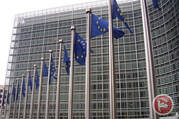
The European Union (EU) and Ireland made a contribution of over €20 million to the Palestinian Authority (PA) payment of social allowances to vulnerable families in the occupied West Bank and the besieged Gaza Strip, on Tuesday.
According to an EU press release, the contribution will go through the Palestinian Ministry of Social Development’s Cash Transfer Program responsible for the provision of basic social protection to the most vulnerable families in the West Bank and Gaza.
The social allowances are paid on a quarterly basis to some 108,000 vulnerable families.
The press release pointed out that EU’s contribution of €20 million and Ireland’s €275,000 will cover the social allowances of around 76,700 families of which 77% live in the Gaza Strip.
Jonathan Conlon, Representative of Ireland, said at this occasion that "Support for the PA Ministry of Social Development Cash Transfer Program is a part of Ireland's ongoing efforts to improve life for the most vulnerable in Gaza. As has long been recognized, the closure of the Gaza Strip has created an untenable situation and the people of Gaza deserve better.”
Conlon noted, “Through our programming and our political dialogues, Ireland seeks to offer hope to people living there and to bring about a sustainable improvement in living conditions."
Tomas Niklasson, Deputy European Union Representative, stressed that the "EU and Member States remain committed to supporting Palestinians in accessing basic needs to guarantee a fair and dignified life for every Palestinian family. Following the financial crisis faced by the PA, this is the very much awaited first contribution in 2019. A protected and empowered Palestinian society is a key element in building the future Palestinian State."
According to an EU press release, the contribution will go through the Palestinian Ministry of Social Development’s Cash Transfer Program responsible for the provision of basic social protection to the most vulnerable families in the West Bank and Gaza.
The social allowances are paid on a quarterly basis to some 108,000 vulnerable families.
The press release pointed out that EU’s contribution of €20 million and Ireland’s €275,000 will cover the social allowances of around 76,700 families of which 77% live in the Gaza Strip.
Jonathan Conlon, Representative of Ireland, said at this occasion that "Support for the PA Ministry of Social Development Cash Transfer Program is a part of Ireland's ongoing efforts to improve life for the most vulnerable in Gaza. As has long been recognized, the closure of the Gaza Strip has created an untenable situation and the people of Gaza deserve better.”
Conlon noted, “Through our programming and our political dialogues, Ireland seeks to offer hope to people living there and to bring about a sustainable improvement in living conditions."
Tomas Niklasson, Deputy European Union Representative, stressed that the "EU and Member States remain committed to supporting Palestinians in accessing basic needs to guarantee a fair and dignified life for every Palestinian family. Following the financial crisis faced by the PA, this is the very much awaited first contribution in 2019. A protected and empowered Palestinian society is a key element in building the future Palestinian State."
13 may 2019
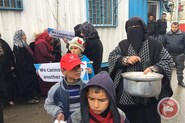
The United Nations Relief and Works Agency for Palestine Refugees in the Near East (UNRWA) expressed real concern, on Monday, that unless it secures at least an additional $60 million by June, its ability to continue providing food to more than one million Palestinian refugees in Gaza will be severely challenged.
UNRWA said in a statement, “At a time when Muslims around the world are observing the holy month of Ramadan, often characterized by the festive nature of its Iftars, in Gaza, more than half the population depends on food aid from the international community.”
The statement stressed that unless UNRWA secures “at least an additional $60 million by June, their ability to continue providing food to more than one million Palestinian refugees in Gaza, including some 620,000 abject poor - those who cannot cover their basic food needs and who have to survive on $1.6 per day - and nearly 390,000 absolute poor - those who survive on about $3.5 per day – will be severely challenged.”
UNRWA is funded almost entirely by voluntary contributions and financial support has been outpaced by the growth in needs. From fewer than 80,000 Palestine refugees receiving UNRWA social assistance in Gaza in the year 2000, there are today over one million people who need emergency food assistance without which they cannot get through their day.
Matthias Schmale, Director of UNRWA Operations in Gaza, said “This is a near ten-fold increase caused by the blockade that lead to the closure of Gaza and its disastrous impact on the local economy, the successive conflicts that razed entire neighborhoods and public infrastructure to the ground, and the ongoing internal Palestinian political crisis that started in 2007 with the arrival of Hamas to power in Gaza.”
A report issued by the United Nations in 2017 warned that the Gaza Strip would be "uninhabitable" by 2020.
Today, with over 53% unemployment rate among Gaza’s population and with more than one million people dependent on quarterly UNRWA food handouts, it is mostly preventive humanitarian action of UN agencies, including UNRWA, and remittances from abroad that have held Gaza back from the brink of total collapse.
Following the establishment of the State of Israel in 1948, the United Nations founded UNWRA, to help resettle nearly 700,000 Palestinians after the Arab-Israeli war; UNRWA says that there are 5.3 million Palestinian refugees in the world.
UNRWA currently provides services to some 5 million Palestinian refugees in Jordan, Lebanon, Syria, the occupied Palestinian territories, and the besieged Gaza Strip.
UNRWA said in a statement, “At a time when Muslims around the world are observing the holy month of Ramadan, often characterized by the festive nature of its Iftars, in Gaza, more than half the population depends on food aid from the international community.”
The statement stressed that unless UNRWA secures “at least an additional $60 million by June, their ability to continue providing food to more than one million Palestinian refugees in Gaza, including some 620,000 abject poor - those who cannot cover their basic food needs and who have to survive on $1.6 per day - and nearly 390,000 absolute poor - those who survive on about $3.5 per day – will be severely challenged.”
UNRWA is funded almost entirely by voluntary contributions and financial support has been outpaced by the growth in needs. From fewer than 80,000 Palestine refugees receiving UNRWA social assistance in Gaza in the year 2000, there are today over one million people who need emergency food assistance without which they cannot get through their day.
Matthias Schmale, Director of UNRWA Operations in Gaza, said “This is a near ten-fold increase caused by the blockade that lead to the closure of Gaza and its disastrous impact on the local economy, the successive conflicts that razed entire neighborhoods and public infrastructure to the ground, and the ongoing internal Palestinian political crisis that started in 2007 with the arrival of Hamas to power in Gaza.”
A report issued by the United Nations in 2017 warned that the Gaza Strip would be "uninhabitable" by 2020.
Today, with over 53% unemployment rate among Gaza’s population and with more than one million people dependent on quarterly UNRWA food handouts, it is mostly preventive humanitarian action of UN agencies, including UNRWA, and remittances from abroad that have held Gaza back from the brink of total collapse.
Following the establishment of the State of Israel in 1948, the United Nations founded UNWRA, to help resettle nearly 700,000 Palestinians after the Arab-Israeli war; UNRWA says that there are 5.3 million Palestinian refugees in the world.
UNRWA currently provides services to some 5 million Palestinian refugees in Jordan, Lebanon, Syria, the occupied Palestinian territories, and the besieged Gaza Strip.
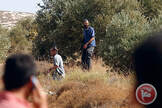
Israeli settlers chopped down dozens of Palestinian-owned almond trees in the Yanun village, south of the northern occupied West Bank district of Nablus, on Monday.
Rashed Marar, head of the village council, told Ma'an that a number of Israeli settlers from the illegal Israeli settlement of Hill 777, located north of Yanun, chopped down dozens of almond trees.
Marar mentioned that he was unable to reach the area due to Israeli forces surrounding the trees and providing protection to the settlers.
Hence, Marar could not confirm the actual number of trees that have been chopped down.
More than 600,000 Israelis live in Jewish-only settlements across occupied East Jerusalem and the West Bank in violation of international law, with recent announcements of settlement expansion provoking condemnation from the international community.
The Israeli human rights group B'Tselem reported that Israeli settlers' vandalism in the occupied West Bank is a daily routine and is fully backed by Israeli authorities.
"In just over two months, from the beginning of May to 7 July 2018, B'Tselem documented 10 instances in which settlers destroyed a total of more than 2,000 trees and grapevines and burned down a barley field and bales of hay," B'Tselem said in its report.
The report added "Settler violence and vandalism takes place with full backing by the Israeli authorities. Sometimes soldiers take part in the assault; at other times, they stand idly by. The police makes no substantial effort to investigate the incidents, nor takes measures to prevent them or stop them in real time."
Rashed Marar, head of the village council, told Ma'an that a number of Israeli settlers from the illegal Israeli settlement of Hill 777, located north of Yanun, chopped down dozens of almond trees.
Marar mentioned that he was unable to reach the area due to Israeli forces surrounding the trees and providing protection to the settlers.
Hence, Marar could not confirm the actual number of trees that have been chopped down.
More than 600,000 Israelis live in Jewish-only settlements across occupied East Jerusalem and the West Bank in violation of international law, with recent announcements of settlement expansion provoking condemnation from the international community.
The Israeli human rights group B'Tselem reported that Israeli settlers' vandalism in the occupied West Bank is a daily routine and is fully backed by Israeli authorities.
"In just over two months, from the beginning of May to 7 July 2018, B'Tselem documented 10 instances in which settlers destroyed a total of more than 2,000 trees and grapevines and burned down a barley field and bales of hay," B'Tselem said in its report.
The report added "Settler violence and vandalism takes place with full backing by the Israeli authorities. Sometimes soldiers take part in the assault; at other times, they stand idly by. The police makes no substantial effort to investigate the incidents, nor takes measures to prevent them or stop them in real time."
12 may 2019
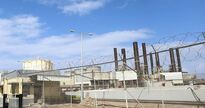
The electricity distribution company in the Gaza Strip said there would be an improvement in the daily power supply program after operating a third turbine in the power plant.
Mohamed Thabet, director of the public relations at the company, stated on Sunday that the operation of the third turbine would enhance the electricity distribution program in all areas of Gaza.
The third turbine stopped working during the last Israeli aggression against Gaza after fuel shipments stopped to enter through border crossings.
Mohamed Thabet, director of the public relations at the company, stated on Sunday that the operation of the third turbine would enhance the electricity distribution program in all areas of Gaza.
The third turbine stopped working during the last Israeli aggression against Gaza after fuel shipments stopped to enter through border crossings.
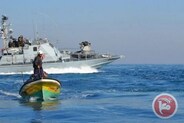
Israel released three Palestinian fishermen, on Saturday evening, who were detained earlier off the central coast of the besieged Gaza Strip.
Head of the Palestinian Fishermen Union in Gaza, Zakariya Bakr, told Ma'an earlier that the three fishermen were released through the Erez (Beit Hanoun) border crossing.
Bakr identified the fishermen as three brothers, Amran, Mansour, and Atef Bakr.
Bakr added that the three were detained by Israeli naval forces earlier on Saturday for an unknown reason.
In addition, Bakr said that following their detention, the Israeli navy confiscated their fishing boat until further notice and sailed it towards the Israeli Ashdod seaport.
As part of Israel's blockade of the coastal enclave since 2007, the Israeli army, citing security concerns, requires Palestinian fishermen to work within a limited "designated fishing zone," the exact limits of which are decided by the Israeli authorities and have historically fluctuated.
The Israeli army regularly detains and opens fire on unarmed Palestinian fishermen, shepherds, and farmers along the border areas if they approach the unilaterally declared buffer zone.
Israeli human rights group B'Tselem recently concluded that Israel's Gaza closure and "harassment of fishermen" have been "destroying Gaza's fishing sector," with 95% of fishermen living below the poverty line.
Head of the Palestinian Fishermen Union in Gaza, Zakariya Bakr, told Ma'an earlier that the three fishermen were released through the Erez (Beit Hanoun) border crossing.
Bakr identified the fishermen as three brothers, Amran, Mansour, and Atef Bakr.
Bakr added that the three were detained by Israeli naval forces earlier on Saturday for an unknown reason.
In addition, Bakr said that following their detention, the Israeli navy confiscated their fishing boat until further notice and sailed it towards the Israeli Ashdod seaport.
As part of Israel's blockade of the coastal enclave since 2007, the Israeli army, citing security concerns, requires Palestinian fishermen to work within a limited "designated fishing zone," the exact limits of which are decided by the Israeli authorities and have historically fluctuated.
The Israeli army regularly detains and opens fire on unarmed Palestinian fishermen, shepherds, and farmers along the border areas if they approach the unilaterally declared buffer zone.
Israeli human rights group B'Tselem recently concluded that Israel's Gaza closure and "harassment of fishermen" have been "destroying Gaza's fishing sector," with 95% of fishermen living below the poverty line.
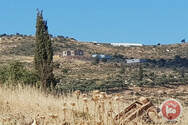
A new illegal Israeli settlement outpost was set up, on Saturday, on Palestinian-owned lands belonging to the residents of the Deir al-Hatab village, east of the northern occupied West Bank district of Nablus.
A Palestinian official who monitors settlement activist in the northern West Bank, Ghassan Daghlas, told Ma'an that the residents of Deit al-Hatab were shocked to find out on Saturday noon that Israeli settlers set up a new settlement outpost, in the form of three large caravans, on their lands.
In August 2018, the Jerusalem District Court ruled that if Israeli settlers built a settlement on private Palestinian land with "good intentions" then it should not be removed. Therefore, allowing more Palestinian lands to be seized by Israeli settlers as they see fit.
Hanan Ashrawi, Palestinian Liberation Organization (PLO) Executive Committee Member, said that the court's ruling provides the Israeli settlers with further motivation "to steal the private property of Palestinian landowners throughout occupied Palestine without any curbs or accountability."
A Palestinian official who monitors settlement activist in the northern West Bank, Ghassan Daghlas, told Ma'an that the residents of Deit al-Hatab were shocked to find out on Saturday noon that Israeli settlers set up a new settlement outpost, in the form of three large caravans, on their lands.
In August 2018, the Jerusalem District Court ruled that if Israeli settlers built a settlement on private Palestinian land with "good intentions" then it should not be removed. Therefore, allowing more Palestinian lands to be seized by Israeli settlers as they see fit.
Hanan Ashrawi, Palestinian Liberation Organization (PLO) Executive Committee Member, said that the court's ruling provides the Israeli settlers with further motivation "to steal the private property of Palestinian landowners throughout occupied Palestine without any curbs or accountability."
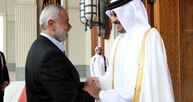
Head of Hamas’s political bureau Ismail Haneyya on Saturday talked over the phone with Emir of Qatar Sheikh Tamim bin Hamad Al Thani and expressed his thanks for the new Qatari grant for the Palestinian people in the Gaza Strip and the West Bank.
In a press release issued by his office, Haneyya congratulated Sheikh Tamim and the Qatari people on the occasion of the Holy Month of Ramadan.
The Hamas official extended his sincere thanks and gratitude to his Highness Sheikh Tamim bin Hamad Al Thani and the people of the State of Qatar for this generous support.
For his part, the Qatari Emir congratulated the Hamas leadership and the Palestinian people on the holy month and reiterated his country’s firm and supportive position towards the Palestinian cause and the Palestinian people’s rights.
For his part, the Emir of Qatar congratulated the head of the Political Bureau of Hamas and the Palestinian people on the holy month of Ramadan, affirming Qatar's firm stance and support for the Palestinian cause and the rights of the Palestinian people.
He affirmed that Qatar would continue making great efforts to alleviate the suffering of the Palestinian people in Gaza, lift the siege and achieve the national reconciliation between the Palestinian rivals.
In a press release issued by his office, Haneyya congratulated Sheikh Tamim and the Qatari people on the occasion of the Holy Month of Ramadan.
The Hamas official extended his sincere thanks and gratitude to his Highness Sheikh Tamim bin Hamad Al Thani and the people of the State of Qatar for this generous support.
For his part, the Qatari Emir congratulated the Hamas leadership and the Palestinian people on the holy month and reiterated his country’s firm and supportive position towards the Palestinian cause and the Palestinian people’s rights.
For his part, the Emir of Qatar congratulated the head of the Political Bureau of Hamas and the Palestinian people on the holy month of Ramadan, affirming Qatar's firm stance and support for the Palestinian cause and the rights of the Palestinian people.
He affirmed that Qatar would continue making great efforts to alleviate the suffering of the Palestinian people in Gaza, lift the siege and achieve the national reconciliation between the Palestinian rivals.
11 may 2019
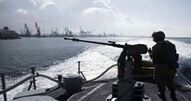
The Israeli occupation navy on Saturday arrested three Palestinian fishermen off the shore of the besieged Gaza Strip.
Zakariya Baker, a Palestinian official in charge of documenting Israeli attacks on Gaza fishermen, said that Israeli gunboats heavily opened fire at fishing boats west of Gaza city and detained three fishermen.
Baker said that the Israeli navy arrested the three brothers Emran, Mansour, and Atef Baker, seized their boat, and transferred them to an undeclared destination.
On Friday, the Israeli authorities allowed Gaza fishermen to resume fishing after a week-long ban in the wake of the latest military assault on the seaside area and expanded the permitted fishing zone to 12 nautical miles.
The Israeli naval forces on almost a daily basis chase Palestinian fishermen in Gaza, shoot at them, arrest them, or confiscate their boats and fishing equipment in violation of the agreement signed between Israel and Palestinian resistance factions following the 2014 war.
Zakariya Baker, a Palestinian official in charge of documenting Israeli attacks on Gaza fishermen, said that Israeli gunboats heavily opened fire at fishing boats west of Gaza city and detained three fishermen.
Baker said that the Israeli navy arrested the three brothers Emran, Mansour, and Atef Baker, seized their boat, and transferred them to an undeclared destination.
On Friday, the Israeli authorities allowed Gaza fishermen to resume fishing after a week-long ban in the wake of the latest military assault on the seaside area and expanded the permitted fishing zone to 12 nautical miles.
The Israeli naval forces on almost a daily basis chase Palestinian fishermen in Gaza, shoot at them, arrest them, or confiscate their boats and fishing equipment in violation of the agreement signed between Israel and Palestinian resistance factions following the 2014 war.
